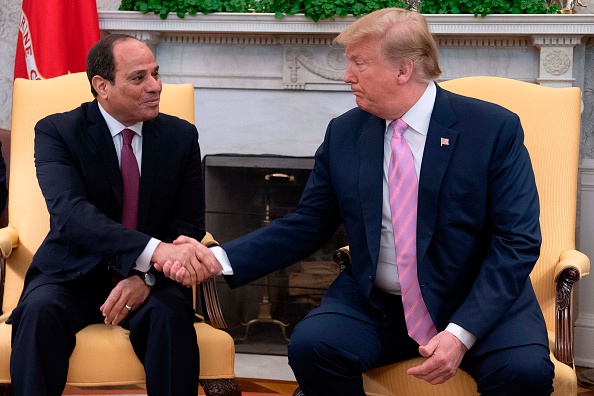After over a year of consideration, the Trump administration appears poised to designate the Muslim Brotherhood as a terrorist group. Though there is widespread political support for such a move, legal and policy analysts harbor doubts as to its prospects.
CAMPS WITHIN THE WHITE HOUSE
Media have reported that the Trump administration is strongly considering designating the Egyptian Muslim Brotherhood a Foreign Terrorist Organization and applying sanctions. This follows an April ninth visit by Egyptian President Abdel Fattah el-Sisi in which the latter urged the move, as well as seeking American endorsement for a constitutional amendment that would allow him to run for two more six-year terms.
Key figures pushing for the FTO designation reportedly include senior administration officials, including National Security Adviser John R. Bolton and Secretary of State Mike Pompeo. However, they are encountering opposition from several career staffers at the Department of Defense, State Department, and other government agencies that have internally articulated legal and policy-oriented reasons for opposing the designation. Though the outcome remains uncertain, some speculate that the administration may eventually compromise on a more limited response.
SUPPORTERS
Opposition to the Muslim Brotherhood draws upon a large reservoir of support. Pressure for an FTO designation has been accumulating for some time. In 2015, Republican Senator Ted Cruz proposed a bill that would compel the State Department to designate the Brotherhood a terrorist organization, arguing that “the Brotherhood’s stated goal is to wage violent jihad against its enemies, and our legislation is a reality check that the United States is on that list as well.” Two years later, in 2017, a bill proposing much the same garnered 77 cosponsors in the House of Representatives.
If the administration’s current effort to designate the Muslim Brotherhood is carried to completion, anyone in the United States or abroad found to have provided “material support or resources” to the group would risk deportation from the United States, as well as financial sanctions.

Various cases have been made in support of such a move. Writing in the influential conservative magazine National Review, Qanta Ahmed argued, “While the Muslim Brotherhood may not be pulling the trigger, it nurtures jihadism efficiently and relentlessly” by “indoctrinating its members with the totalitarian tenets of 20th-century Islamism.” In her view, “in the propagation of terrorism, the Muslim Brotherhood has no equal and no competitor.”
Indeed, supporters of an FTO designation stress that the Brotherhood, while rarely directly engaged in violence, often acts as a protective layer of sympathy and succor around those who do. As Jonathan Schanzer of FDD recently noted in Congressional testimony, “The Muslim Brotherhood is a gateway to jihadism... It’s also a hate group. Its ideology is xenophobic, bigoted, and totalitarian. ”
LEGAL AND DIPLOMATIC COMPLICATIONS
Nevertheless, a successful designation of the Brotherhood is far from assured. As Benjamin Wittes of the influential blog Lawfare has observed, designated organizations are entitled to review by the DC Circuit Court of Appeals and, in the case of the Mojahedin-e Khalq, “litigation over the designation went on for years… and a designation can be thrown out if is arbitrary or capricious or if the administrative record does not support it.”
The legal case for designating the Brotherhood is undermined by the group’s diffuse character and the lack of a single official stance on violence. In other words, the statute governing FTO designations was crafted for relatively centralized organizations embarked on a violent campaign against the United States or its allies. In contrast, the international Muslim Brotherhood is seen to resemble a loose-knit movement whose various factions have, in their public statements, taken contradictory positions on violence and the political process, depending on circumstances.
Designating the Brotherhood a terrorist group is equally complicated diplomatically. As Schanzer notes, in Tunisia and Morocco, “the group has become an accepted element of the ruling elite”, while in countries such as Jordan, “it has an uneasy modus vivendi with the government, fulfilling the role of the loyal opposition.” The thorniest case is presented by Turkey, where an FTO designation could potentially imperil the U.S.’s relationship with Ankara -- already under severe strain -- as President Erdogan is an avowed supporter of the group and its various regional branches.
OPPOSITION
In Washington’s foreign policy community, hesitation to embrace an FTO designation is relatively widespread and stems from several factors, ranging from the Brotherhood’s organizational incoherence to sympathy for the group’s perceived embrace of political reform.
According to Raymond Tanter and Edward Stafford, writing in Foreign Policy, “the Washington think-tank community is split — with most opposed to designation. Specialists on U.S. foreign affairs generally adhere to the position that the MB is more a legitimate political and social organization than a terrorist organization, and its multinational character reflects a diversity of sub-groups, many of which are not terrorist organizations.”
Shadi Hamid of the Brookings Institute, known for casting a more sympathetic eye on the organization, recently contended that “there isn't a single American expert on the Muslim Brotherhood who supports designation. That's because if you study the organization, there's really no way you can conclude, from a factual standpoint, that it meets the designation criteria.”
Others, such as Eric Trager of the Washington Institute for Near East Policy, who counsels against taking the movement’s public statements at face value, have argued against designation for more tactical reasons. In Trager’s view, “A failed Brotherhood designation might ultimately afford the Brotherhood a more generous hearing in certain political and policy circles. So the administration should be wary of overplaying its hand: it could legitimate the Brotherhood in ways it doesn’t intend and in ways that Brotherhood organizations hardly deserve.”









